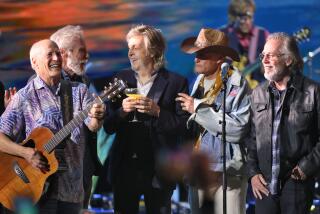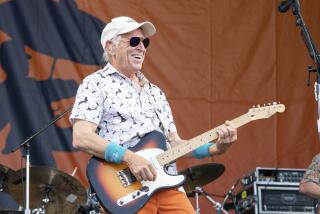Don Kirshner dies at 76; music mogul
Don Kirshner, the veteran music mogul who shepherded songs from a monstrously talented stable of young writers to the top of the pop charts in the 1960s, launched the career of the Monkees and then became a familiar face to millions of rock fans as impresario of his late-night music TV series in the 1970s, died Monday of heart failure in Boca Raton, Fla., where he had lived for the last decade, a family spokeswoman said Tuesday. He was 76.
“Don Kirshner’s Rock Concert” brought the biggest names in rock and pop music to television in live performances instead of the lip-synced sessions that often characterized rock music on television.
FOR THE RECORD:
Don Kirshner: The obituary of pop music mogul Don Kirshner in the Jan. 19 LATExtra section said he served as music supervisor on three Oscar-winning films and listed “To Sir With Love” as one of them. That film did not win an Academy Award. —
Each week Kirshner, usually dressed in a high-collared leisure suit, dryly introduced acts in his distinctive Bronx accent, including the Rolling Stones, Led Zeppelin, Paul McCartney, Elton John, Sly & the Family Stone, Van Morrison, Bruce Springsteen, Pink Floyd, Aerosmith, Barry Manilow, the Eagles, Devo, Prince and countless others over the show’s run from 1973 to 1982.
“In terms of the show, it’s a crucial ‘70s bridge between the Ed Sullivan era of the ‘60s and MTV of the ‘80s,” Ron Simon, curator of TV and radio for the Paley Center for the Media, said Tuesday. “The variety show was in decline, and Kirshner was able to capitalize on many different forms of music that were coming about in the ‘70s.”
His stiff posture and monotonic introductions of musicians led to a famous parody that musician and bandleader Paul Shaffer delivered a number of times on “Saturday Night Live.”
“He was a great character, a lovable character; certainly the most colorful character I’ve ever met,” Shaffer told The Times on Tuesday. “He was very fast-talking, always very emotional about the music he loved and the music he was making.... But when he went on camera, he slowed right down. I guess he was nervous and he froze a little bit, but still spoke from the heart. I found it very humorous, never forgot it.”
Kirshner helped dream up the Monkees, a fabricated pop-rock quartet assembled in the wake of Beatlemania to translate the youthful energy and appeal of their movie “A Hard Day’s Night” into a weekly TV show, which yielded a string of hit singles and albums for the band consequently dubbed “The Prefab Four.”
The group members’ desire to incorporate their own musical sensibilities as songwriters and instrumentalists into the show led to a famous battle over creative control with Kirshner, who ran Colgems Records, the label that put out the Monkees’ recordings.
Guitarist and songwriter Michael Nesmith famously put his fist through the wall of Kirshner’s bungalow at the Beverly Hills Hotel during one of the more heated sessions.
“Donny was there with his attorney,” Monkees drummer and singer Micky Dolenz told the Washington Post in 2004, “basically presenting us with this money and saying, in so many words, ‘Why don’t you shut up and cash the check?’ And that’s not the sort of thing you said to Mike Nesmith at the time. To be honest, I couldn’t have cared less. I was 20 years old, making money. But Mike led this revolt, and out of camaraderie, we all went along.”
The Monkees won, and eventually Kirshner was fired from his role with the group. He went on to form one of pop’s quintessential bubblegum acts targeting teen and preteen fans: the Archies.
Even before the Monkees got started in 1965, Donald Kirshner, born April 17, 1934, in the Bronx borough of New York, was already a music business heavyweight, having helped get a career going for his friend Bobby Darin. He opened a music publishing company that hired rising songwriters, including Neil Diamond, Neil Sedaka and the teams of Gerry Goffin and Carole King, Cynthia Weil and Barry Mann, and Tommy Boyce and Bobby Hart.
Those writers crafted dozens of pop hits in the early to mid-’60s, many of them since lauded as classics of the era. “They’re the modern day Lerner and Loewes and Gershwins and Porters,” Kirshner said in 2001. “These writers, I believe, will be timeless; and the songs will last like all the greats.” For his role in discovering and nurturing so many of them, Time magazine once dubbed him “The Man With the Golden Ear.”
After “Don Kirshner’s Rock Concert” ended its run, Kirshner went into retirement and moved to Florida, where he lived for decades in virtual seclusion with his wife, Sheila.
He served as music supervisor on three Oscar-winning films, “To Sir With Love,” “Lawrence of Arabia” and “Born Free,” but his career extended well beyond the music world. He also championed the careers of many comics: Woody Allen, Steve Martin, Jay Leno, Billy Crystal, Garry Shandling and David Letterman, among others.
In 1963 he sold his publishing catalog for $3 million, a sizable sum at the time for a trove of material estimated decades later to be worth $1 billion for the ongoing revenue generated by such hits as “Up on the Roof,” “On Broadway,” “Will You Love Me Tomorrow,” “You’ve Lost That Lovin’ Feelin’” and “Dream Lover.”
A series of bad business deals in the ‘80s and ‘90s, notably the loss of ownership of the master tapes from the “Rock Concert” series that were sold at auction in 2001 for $125,000, led him to file for bankruptcy in 2000. He returned to action four years later as co-founder of Kirshner International, a company that attempted without much success to develop new music and video content for the Internet age.
Kirshner periodically expressed his disappointment that he was never inducted into the Rock and Roll Hall of Fame as one of its many non-performer honorees.
“I don’t want to sound like sour grapes,” he said in 2004, “but I believe I should have been one of the first three or first five inducted. Seriously. I mean, they’ve got people in there that I trained, and I’m not in? It bothers me, on principle.”
In addition to Sheila, his wife of 50 years, Kirshner is survived by his children, Ricky and Daryn, and five grandchildren.
More to Read
Start your day right
Sign up for Essential California for the L.A. Times biggest news, features and recommendations in your inbox six days a week.
You may occasionally receive promotional content from the Los Angeles Times.






